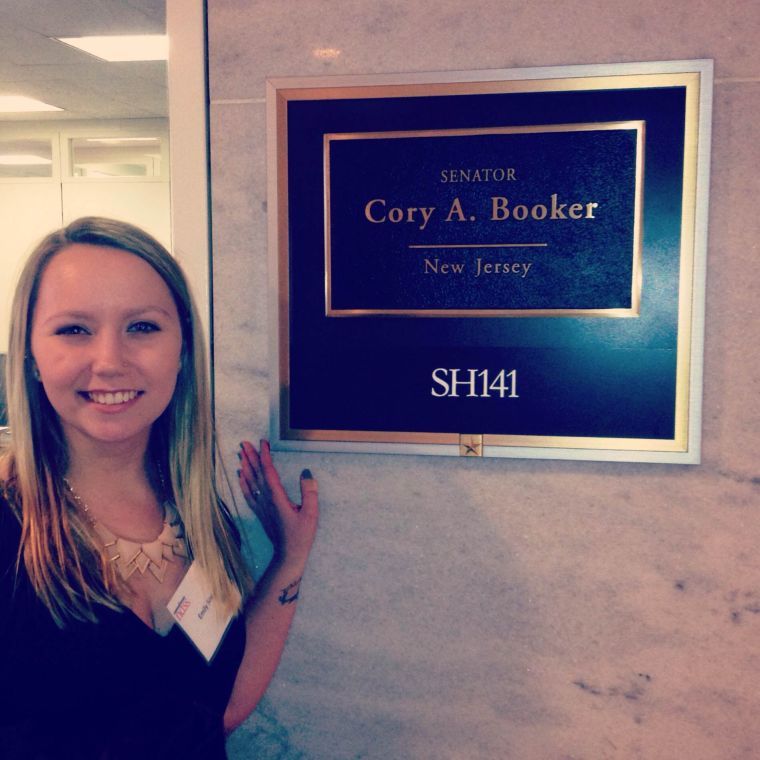
Emily Singer
When she was 15, Emily Singer wanted nothing to do with the Down syndrome community. Despite having a twin brother, Lucas, with Down syndrome, Singer was embarrassed and unwilling to be affiliated.
When she looks back on that part of her life now, Singer said she can’t imagine not caring.
“It wasn’t until I really came into myself as a person that I realized how much influence I could have by telling my story and by getting involved,” said Singer, a sophomore communication major. “It’s so weird thinking about it now.”
Her passion drove her to apply for an internship at the National Down Syndrome Society, a position she’s held since October 2013. Her interest propelled her to participate in NDSS’ Buddy Walk on Washington in February and brought her face to face with politicians to discuss the Achieving a Better Life Experience Act.
The annual walk draws participants from across the country, this year hosting more than 320 advocates from 37 states. Singer helped organize a breakfast honoring “Champions of Change,” including “big wigs” such as House Majority Leader Rep. Eric Cantor (R-Va.) and Sen. Joe Kennedy III (D-Mass.).
Singer’s highlights of the day included small group meetings with senators and representatives or members of their staff in which she said she could feel herself effecting change.
Each meeting was about 30 minutes long, with groups divided by state. Singer, who was in a group from her home state of New Jersey, said before she knew it, she was face to face with a member of Sen. Cory Booker’s (D-N.J.) staff.
“They looked at us and were like, ‘OK, so why are you here?’” Singer said. “At first, nobody said anything, but then I just sort of opened my mouth and stated my purpose and we just started having a conversation. That was a feeling I’ve never felt before.”
The Buddy Walk on Washington focused on the ABLE Act, legislation Congress could consider this session and that could change the lives of disabled Americans across the country.
The bill, which has 66 bipartisan cosponsors in the Senate and 341 in the House, would create tax-free savings accounts for people with disabilities. Right now, individuals can save up to $2,000 at any time, or else risk losing government benefits including Medicare and Social Security, said Sara Weir, NDSS advocacy and affiliate relations vice president.
For Singer and her family, the legislation’s passage could have a direct impact, as Lucas was accepted into postsecondary education at The College of New Jersey. The ABLE Act would allow him to have his own savings account, so he’d be able to pay for college himself, and the same opportunities as his twin sister.
“Really, at the end of the day, it’s a civil rights issue,” Singer said. “The tax code was written 40 years ago, when people with disabilities weren’t going to college. Now, they are, and they’re just being stunted by past legislation.”
Weir, Singer’s internship supervisor, said it’s easy to see Singer’s passion for the issues making an impact on the community.
“She’s fantastic — hardworking and extremely dedicated,” Weir said. “Her connection with her brother makes her so passionate and she exhibits it on a daily basis in the office. We’re lucky to have her on our team.”
Although Singer doesn’t know whether she’ll pursue nonprofit work as a career, she said she wouldn’t be surprised if she found herself working as a Down syndrome advocate years down the line.
Regardless of the future, she said she will never forget the influence the small groups were able to have on Congress — especially legislators who weren’t already sponsors of the bill.
“I really felt like this was the epitome of democracy. We were talking directly to representatives, like, ‘Listen, this is who I am; this is what I believe; this is why this law is important to me,’” Singer said. “Being in those conversations, it was like, ‘Wow, this is a big deal, we’re part of a monumental shift on our community.’ It was so cool.”



